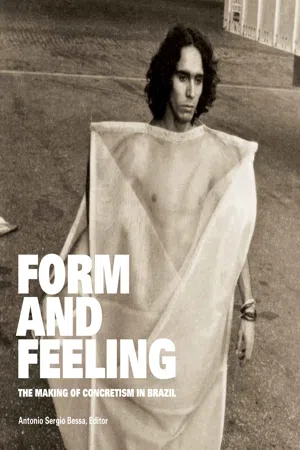
- 256 pages
- English
- PDF
- Available on iOS & Android
About this book
Winner, 2022 Association of University Presses Book, Jacket, and Journal Show in the Scholarly Illustrated Category A significant contribution on the development and aftermath of post–World War II Concretism in Brazil Form and Feeling features a collection of essays by noted scholars exploring the sensorial, experience-based, and participatory practices pioneered in the 1950s by artists and poets such as Flávio de Carvalho, Ivan Serpa, Hélio Oiticica, Haroldo de Campos, Mary Vieira, Lygia Pape, Anna Maria Maiolino, Lygia Clark, Waly Salomão, and Emil Forman, among many others. Fourteen thought-provoking essays examine how many of their strategies constituted a pertinent critique of the country's wide-ranging embrace of Eurocentric modernity while anticipating a number of practices prevalent among contemporary artists today—namely, the rise of art as social practice, the embrace of pedagogical concerns by artists, and relational aesthetics.The fourteen essays collected in this volume consider the ramifications of modernist abstraction in the second half of the twentieth century and contribute to a growing academic field in postwar Brazilian and Latin American art history. Contributions to this anthology examine the development of modernist ideas that flourished in Brazil during a controversial period interspersed by dictatorial regimes. The global aspect of Brazilian art is especially evident in these studies, presenting the relational complexity of their subjects as transcultural, transnational actors while simultaneously contributing to a growing, increasingly nuanced understanding of visual and material culture, performance, and criticism in Brazil. Form and Feeling continues the important process of re-analyzing the intersections of Concretism and Neo concretism, arguing for greater affinities between the primary and lesser-known cast of characters while equally redistributing the strict geographical divisions of São Paulo and Rio de Janeiro. This anthology broadly situates this extraordinary period of artistic experimentation in direct relationship to contemporary factors, such as psychoanalysis, educational systems, poetry, politics, and feminism. It crafts innovative relationships about the constructive hierarchies of form and space, poetry and painting, and mathematics and philosophy, thus engendering new positions for a deeply ensconced period in Brazilian history.
Frequently asked questions
- Essential is ideal for learners and professionals who enjoy exploring a wide range of subjects. Access the Essential Library with 800,000+ trusted titles and best-sellers across business, personal growth, and the humanities. Includes unlimited reading time and Standard Read Aloud voice.
- Complete: Perfect for advanced learners and researchers needing full, unrestricted access. Unlock 1.4M+ books across hundreds of subjects, including academic and specialized titles. The Complete Plan also includes advanced features like Premium Read Aloud and Research Assistant.
Please note we cannot support devices running on iOS 13 and Android 7 or earlier. Learn more about using the app.
Information
Table of contents
- Cover
- FORM AND FEELING
- Title
- Copyright
- CONTENTS
- Posteverything—An Introduction
- I
- II
- III
- Acknowledgments
- List of Contributors
- Index